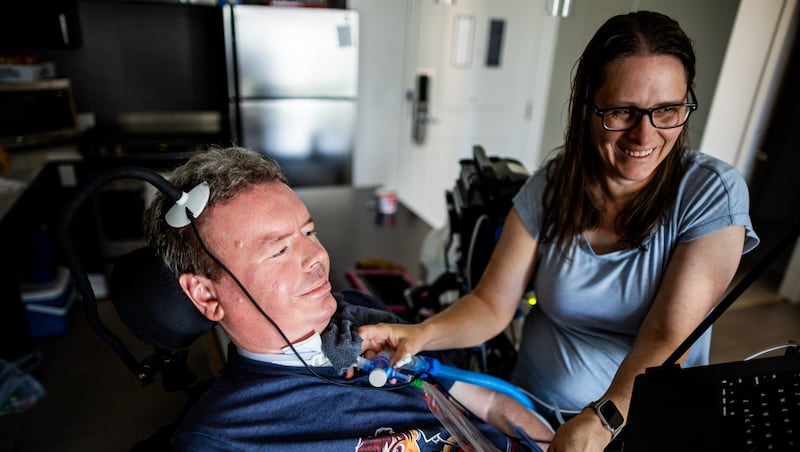
Bradford Smith is conducting an interview, quietly seated in a motorized wheelchair equipped with a computer mounted on a platform positioned opposite his face. The reporter poses a query and subsequently waits patiently for several minutes as Smith contemplates his response. Gradually, the computer starts typing out the reply, either letter by letter or word by word, onto the display before audibly reciting it back.
Smith was diagnosed with amyotrophic lateral sclerosis (ALS), also known as Lou Gehrig’s disease, in 2018. At age 44, he has largely lost most physical abilities but retains full use of his mind. His condition permits only limited movements such as moving his eyes and slightly smiling when happy. However, breathing requires machinery, eating isn't possible for him anymore, and limb movement remains beyond reach. Years ago, Smith became unable to talk; yet through advanced technological solutions, this challenge now exists differently.
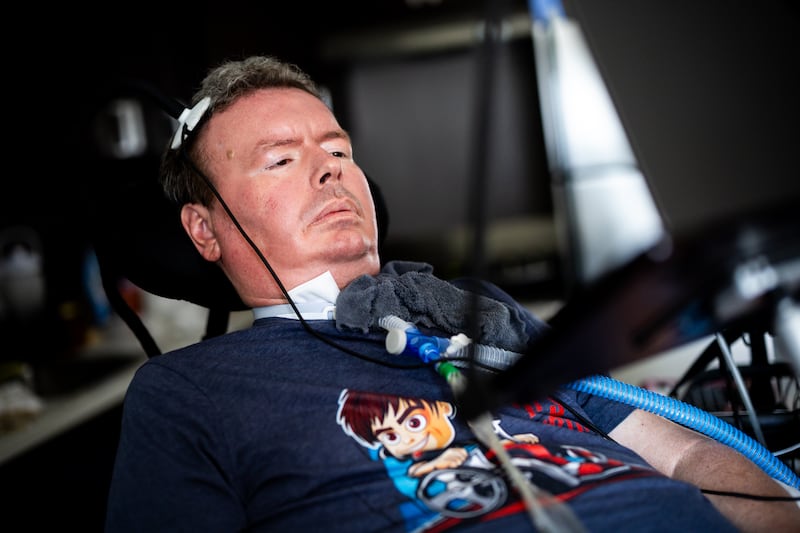
Smith is the third person to receive a Neuralink implant and the first of the recipients who could not speak on his own. The other two had spinal cord injuries but their voices were intact. That turned out to be significant with Neuralink, which is a coin-sized implanted brain-computer interface made by a company Elon Musk founded with a team of scientists and engineers.
Neuralink features 1,024 electrodes capable of detecting brain activity and transmitting this data to a computer. An artificial intelligence system interprets Brad's mental inputs as commands for typing. He doesn’t physically move; instead, he mentally selects responses from pre-determined options, after which the computer vocalizes these selections. The dialogue includes occasional lulls since communicating thoughts without bodily movement takes time. Despite the delays, the experience is deeply gratifying—it restored his ability to communicate verbally. Should Brad and his interlocutor agree to allow additional processing time, Neuralink enables Brad to answer queries using synthesized speech generated by AI technology. However, let us delve further into how this works momentarily.
Thursday, Musk’s company announced that it had received a “Breakthrough Device” designation from the U.S. Food and Drug Administration. It was definitely a breakthrough for the Smith family.
A devastating diagnosis
Brad spent much of his childhood and early adulthood in Utah, staying there until he reached his thirties. However, upon marrying Tiffany 16 years ago, both were eager for fresh experiences and possibilities. As a result, they relocated several times to accommodate Brad’s career while beginning their family. Their children now include Lincoln, who is 13, Edison, aged 9, and Abigail, who is 7.
For the Smiths, life has revolved around a three-legged stool focused on God, family, and diligence.
While playing dodgeball at their church, which belongs to The Church of Jesus Christ of Latter-day Saints, he mentioned tweaking his shoulder. However, rather than recovering, it grew progressively weaker.
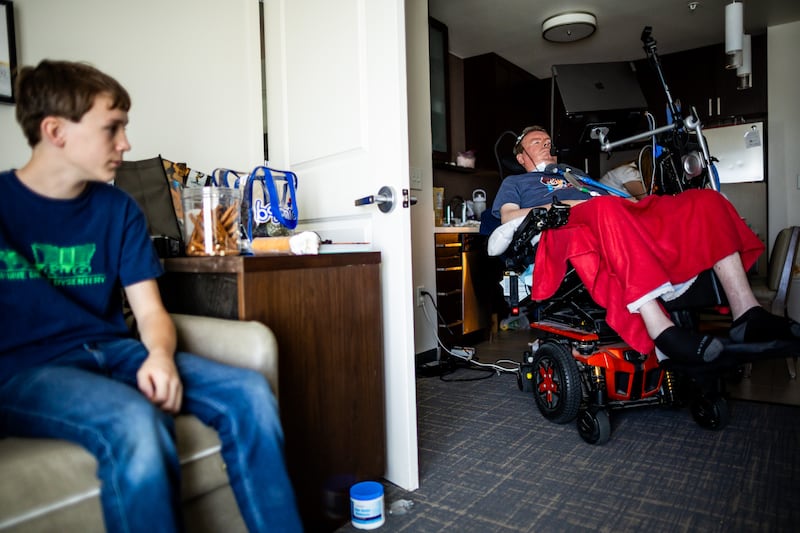
It was a neurologist who told him his muscles and nerves weren’t carrying electricity and it was quite likely to be ALS. If he doubted the diagnosis was devastating, any illusion disappeared when the physician gave him a hug. He left the office, he said, “in a haze of grief.”
In the parking lot, he cried out and fervently prayed. He mentions that the reply he received was akin to a "big trust me." This made him feel assured that everything would turn out fine.
However, he was faced with the task of informing both his spouse and his business associate about the potential diagnosis of a life-threatening illness. Additionally, further tests were necessary to eliminate the chance of a spinal cord injury, as such an outcome would paradoxically be considered less dire under these circumstances.
The ALS diagnosis was confirmed when he subsequently found out during his visit to a specialized clinic in Phoenix.
In 2020, he required a tracheotomy to assist with breathing. Consequently, his ability to speak was silenced.
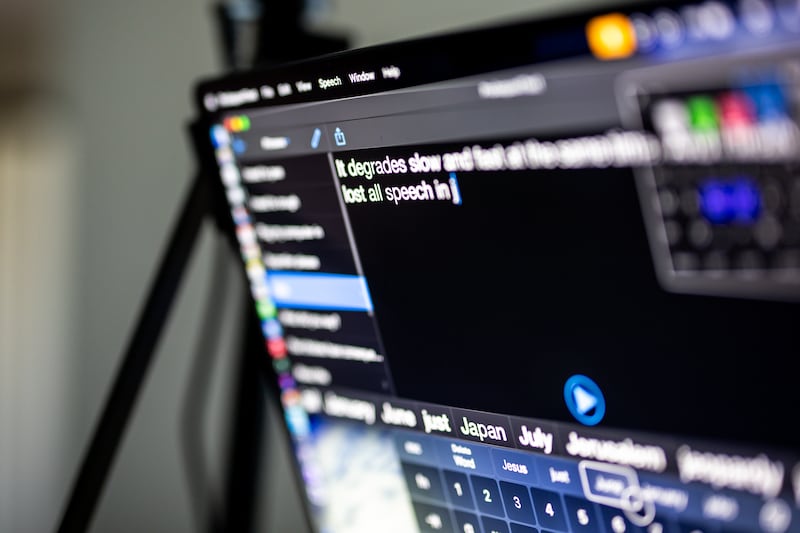
Optimism manifested through technological advancements
By then, Brad and Tiffany Smith, residents of Glendale, Arizona, had been keeping an eye on reports about a novel gadget that could potentially enable individuals to transmit thoughts via computers using telepathy. Upon discovering that Neuralink launched a patient portal for those intrigued by this technology, "I immediately signed up," Bradley shared with Deseret News. "I kept close tabs on its progress. The fact that it took place in Arizona, not far from my home, made it particularly significant."
Upon receiving an email from a Neuralink representative in early 2024, he mentioned that he "initiated a relentless self-promotion drive. I was really eager for this opportunity."
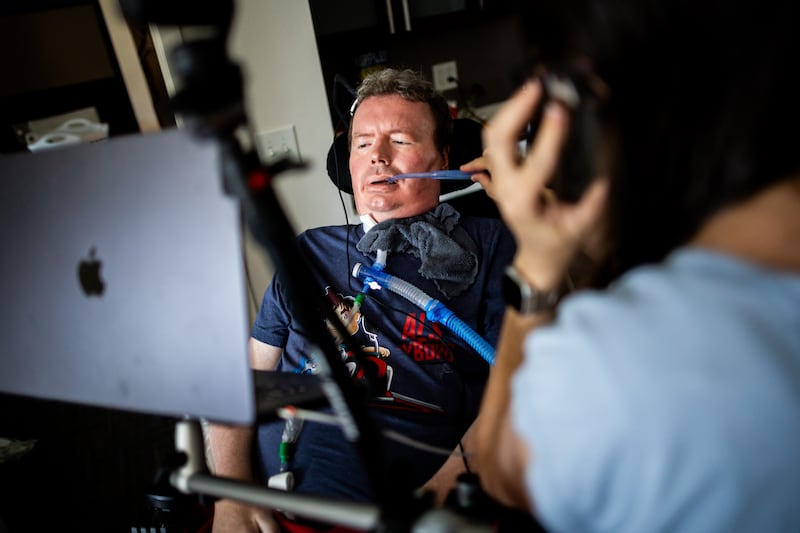
The approach taken with the device and its approval has been one step at a time. Following the initial recipient of the implant, data was gathered to determine whether the FDA would permit a second individual to receive it. This information needed to be compiled to assess the possibility of proceeding to a third participant.
The first two were people who’d lost the ability to move because of spinal cord injury. They could talk. Brad was the third person to receive the implant, but he was also a pioneer in that voice commands that helped the other two wouldn’t help him. So he became patient/consultant as the Neuralink team worked to figure out how to change its technology to meet his very different situation.
Securing a position far enough to be deemed necessary involved numerous examinations and scans. "Spending three hours inside an MRI machine isn’t easy," he commented. "Additionally, I underwent multiple psychological assessments to ensure I wasn’t contemplating suicide. They also established a benchmark to confirm my intellect and capabilities remained intact."
Despite being on a ventilator, he said he got the impression he was the front-runner to be patient No. 3, and was buoyed when the hospital asked him if, “hypothetically,” he could be available the first week in November last year. In late October, the FDA gave a thumbs-up and he was implanted two weeks later.
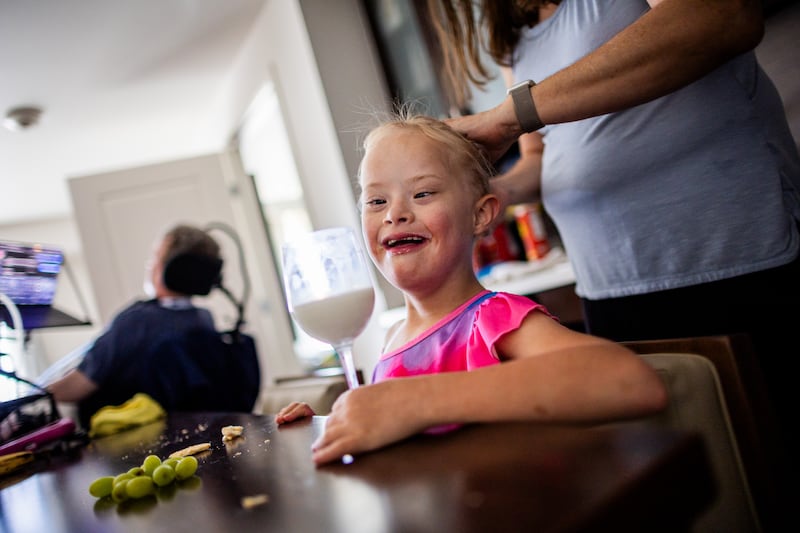
Faith and family strengthen his endurance.
In the end, an infection will be what kills him, he stated. However, his wife looks after him exceptionally well, he mentioned, prolonging his life significantly. To him, she is his " ace in the hole."
As he tells his story in a mix of answers he pre-typed and new responses, Smith sometimes uses his mind to hit a keyboard shortcut that prompts the voice to say “I need to cough.” Lincoln and Tiffany both know what to do. He can’t actually cough; they have to suction phlegm to clear his airway and his mouth.
For the kids, who were quite young when he received his diagnosis, everything seems perfectly ordinary. "Strange how effortlessly children adapt to an altered sense of normal," Smith reflected.
Currently, The Smiths are in Utah attending Tiffany's sister's wedding. While Tiffany mentioned she cannot fathom what else her husband could possibly lose, she noted that despite this, his family members have observed him smiling more often, feeling happier, and experiencing a stronger sense of direction since regaining the ability to communicate effectively.
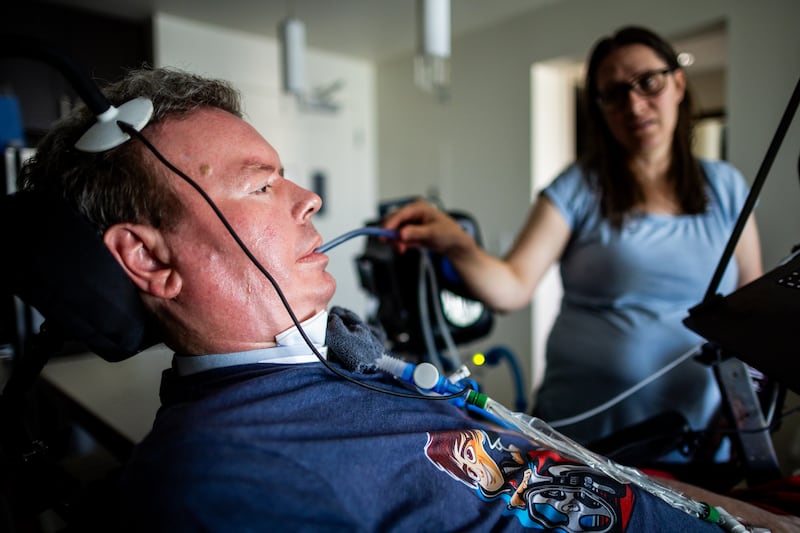
He frequently makes jokes, mentioning he’s "high maintenance," and at some point remarks that he’s "overweight and lazy."
After receiving his diagnosis, one of the things he chose to do was narrate stories for his kids—stories about meeting Tiffany, anecdotes from his school days, and various other memories. These recordings were stored in a vocal database that later turned out to be quite important. Recently, they have been utilized to assist in training artificial intelligence so that it could mimic his speaking style. However, he does not always opt to use this feature. Often, using the default computer-generated voice proves quicker and simpler.
However, for an open-ended discussion, the AI-created Brad voice is perfect, as it also reflects his distinctive sense of humor. Drawing from statements he has made or could make, his computer occasionally offers multiple response options, frequently sassily witty. He may select one of these suggestions, tweak them, or opt to share something entirely different instead.
He mentioned that he strongly believes his skill of typing with his mind—without using his fingers—qualifies him as a superhero.
Choosing life
Initially, during his illness, he and Tiffany agreed that he would continue living for as long as he maintained a good quality of life. For them, this meant being an effective dad and helping other people.
He mentioned that Neuralink has assisted greatly with all of those aspects.
At times, he has struggled with needing or receiving assistance from others. Nonetheless, he proceeds despite these challenges. "I've come to understand that allowing others to serve me holds equal importance to my own service towards them. Asking for help remains difficult."
His counsel to others is: "Throughout your journey in life, be amiable towards everybody and put effort into all tasks! You never know when you might require a friend to lend you assistance!"
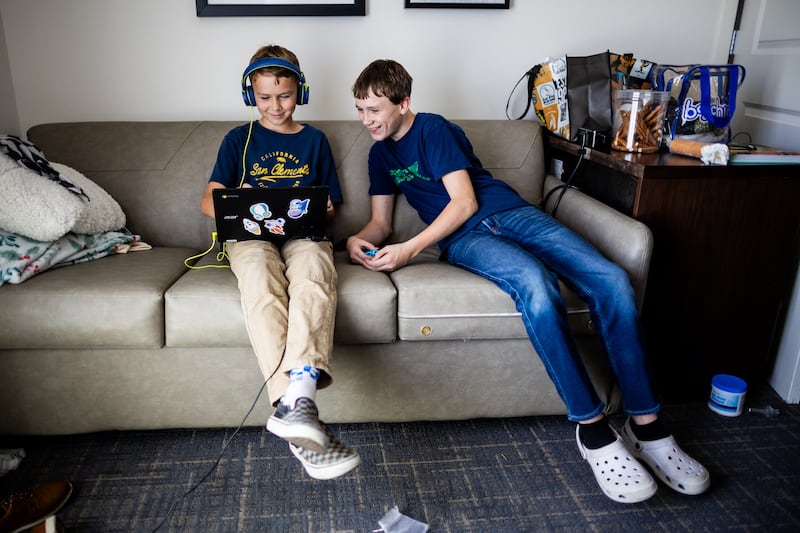
Faith has been a cornerstone in this journey and he’s working to submit to God’s will in his life. “There’s no magic formula,” he said, then paraphrases President Jeffrey R. Holland, acting president of the Quorum of the Twelve Apostles in his faith: salvation is not a cheap experience.
“It took me a few months to process my testimony after my death-sentence diagnosis,” Smith said. “I had to remember why I believe what I believe.”
Tiffany shared with the Deseret News that faith has proven beneficial for everyone involved as they've adapted to his circumstances. "I cannot conceive of living without faith or believing in an existence beyond our current lives," she added.
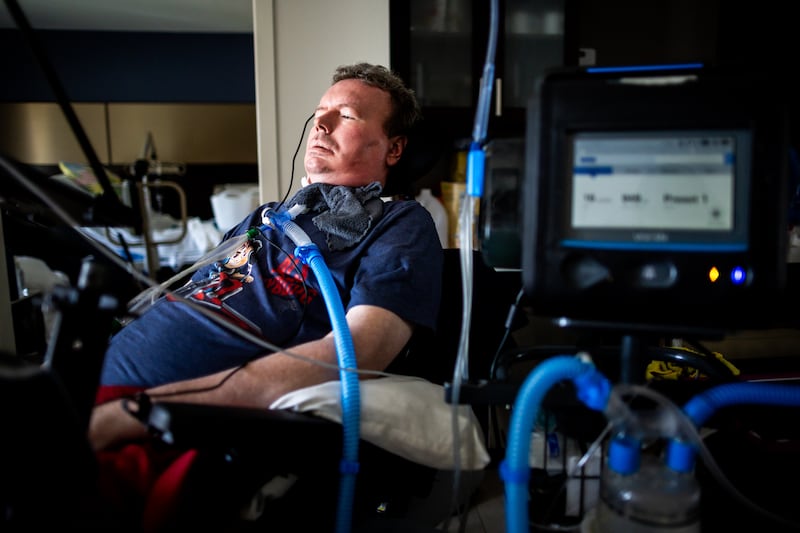
She mentioned that she has faith in miracles, yet the chance of him recovering in this lifetime is quite low. Nonetheless, "I am confident that this life isn’t over, and our family will carry on."
I feel incredibly fortunate in numerous aspects of my life! I've had the opportunity to work across different countries and encountered many individuals who find joy with far fewer possessions than I possess," Smith stated. "Given this viewpoint, what reason do I have for being upset?
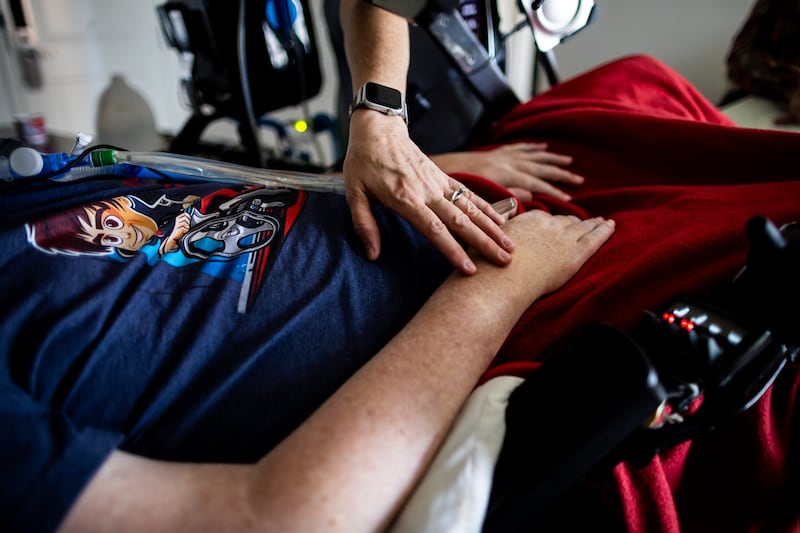
0 Response to "Technology Restored His Voice, Allowing Elon Musk's Innovations to Speak for Him"
Post a Comment